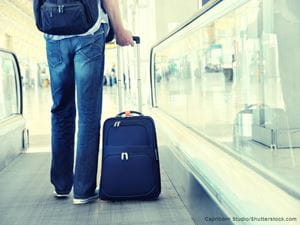
Just about everyone has wanted to travel at some point, but taking off on a grand adventure can be intimidating. This is especially true for novice or first time travelers. Whether you are a veteran globetrotter or a student taking their first international trip, you will definitely need to do your research on your destination before leaving. What you need to pack and what you need to know will vary by location, but there are some rules about travel that do not change regardless of where you are headed. Here are the top eight traveling do’s and don’ts you need to know before setting out.
DO try the local cuisine.
Even the most adventurous traveler can balk at the idea of consuming some of the things they find on the menu in their destination. They might opt for options that they feel are safer either in that they are familiar options or that they seem less questionable on the nutritional and edibility scales. Food, however, is a huge part of culture. If you have taken the time to visit a new place, you need to try the food. Depending on the location, you might end up pointing blindly to something on a menu written in Hebrew and watching as the wait staff snickers ominously. You might also be able to have a lengthy conversation with your waitress about whether or not you will actually like fried crawdads. Even if you have no idea what is actually on your plate, try it. You might be baffled to find out later that the translucent strips you adored in Japan were jellyfish or that thing from Berlin you thought was nasty was actually wienerschnitzel.
If you have severe food allergies, you obviously need to take care to avoid eating those items. As such, learn the local words for such foods so you can convey “no peanuts, I am allergic” without needing to resort to interpretive dance. Otherwise, try everything. This does not just apply to foreign countries either. Plenty of tourists from New England have taken one look at creole cooking in Louisiana and fled. Put your adventurous hat on and try the food. If it makes you feel better, do not ask what you are eating until you decide if you like it or not.
DON’T dress like a tourist.
Sneakers with white socks, a fanny pack, a map and a t-shirt with the most recognizable landmark in the nation emblazoned on it — put together, these all scream “tourist.” They also tell savvy or unscrupulous locals that you are an easy target for scams, theft or overcharging. Your sneakers are probably your most reliable traveling shoes, but do your best to limit how overtly the rest of your outfit looks like that of a stereotypical tourist. Wear normal clothing and ditch the fanny pack. If you feel the need to keep your valuables more secure than simply in your pocket, opt for a small lanyard-style holder or neck wallet that you can tuck under your shirt. Keep only the most important things with you, such as your passport and phone, and lock the rest of your valuables in a safe in the hotel.
DO photocopy your passport.
Every international traveler’s worst nightmare is their passport being either stolen or lost. A photocopy of your passport might be enough to get you out of a sticky situation if your passport has been stolen or gone missing. If possible, memorize your passport number in addition to having a photocopy. Do not, however, count on your photocopy being enough to act as a normal passport. If your passport has been irreparably damaged, lost or stolen, call your nation’s nearest embassy to find out what you need to do to ensure your safety. You will most likely have to make a trip to the embassy in person. If for some reason you cannot reach your own nation’s embassy safely, be aware of which nation’s embassy is the next best bet for you. For Americans, the next best options are usually the British or Canadian embassies, but your own nation’s embassy or consulate is by far the best option.
DON’T take a nap as soon as you arrive.
If you are flying west to east, the odds are that you caught a red-eye. The theory of red-eye flights, of course, is that you spend the flight sleeping so you can function when you land. Anyone who has ever had an overnight flight knows that the idea of sleeping soundly on a plane is laughable. As such, almost everyone who has flown a red-eye, whether internationally or simply from one coast to the other, knows the feeling of landing in the airport exhausted, uncomfortable, irritable and willing to do just about anything in order to get some sleep.
You may not want to hear it, but that two hour nap you have been dreaming about since the plane took off is a very bad idea. When you land in a new time zone, your best bet is to get on the new schedule as quickly as possible. This means limiting yourself to a 30 or 60 minute nap when you were up all night traveling so you can go to bed at a reasonable local time or forcing yourself to go to bed at what your body clock says is an obscenely early time when you have flown east to west. It may make for an unpleasant afternoon, but getting on local time as soon as possible will help limit your jet lag and make your vacation far more enjoyable.
DO your research before leaving.
Whenever you are going somewhere new, it will behoove you to have done some basic research before you head out for your adventure. Otherwise, you might end up having more of an adventure than you planned on. Read up on the local customs so that you can avoid being the tourist everyone remembers for their terrible manners. This is true whether you are traveling internationally or domestically. If you head to the South, for instance, you are going to get lots of glares for foul language or letting the door slam in the face of the person behind you. Stopping in the middle of the sidewalk in New York City, on the other hand, is sure to earn you the locals’ ire. If you are not fluent in the language of your destination, learn a few basic phrases as well as how they look when they are written. Being able to ask for directions to the train station will be invaluable if you get lost in Paris, and knowing the common kanji for “exit” and “bathroom” will ensure you are not wandering around Tokyo’s subway stations in complete confusion.
Be aware of any local customs or habits that differ significantly from your own. Asian countries, for example, often use “squatty potties” set into the floor instead of Western style “thrones.” This can be a nasty surprise for someone with poor leg strength and a desperate need to relieve themselves. Similarly, do some background reading on the European beaches before taking your family lest you stumble upon a topless beach by accident.
DON’T stick to touristy locations.
Tourist traps are tourist traps for a reason. Everyone who goes to Paris, after all, is determined to see the Eiffel Tower, and no one who visits China will be content without walking the Great Wall. Do not, however, limit yourself only to those obvious locations. If you are in Israel, do not remain solely in Jerusalem. Climb Masada, hike the Banias Nature Reserve and shop at Beersheva’s Bedouin market as well. Do not stay only on the Strip if you are in Vegas. Visit some of the lesser known places as well.
The best way to find hidden gems is to ask the locals. Explain that you do not want to visit more touristy locations. You want to know where they take their families or friends. Do this when you are hunting both for attractions and for restaurants. The local places are likely to be less crowded, less expensive and every bit as beautiful or delicious as the tourist traps.
DO pack for all weather.
Obviously, you want to check the weather for your destination when you are packing and plan accordingly. No one visiting Israel in June needs a winter coat, and no person planning to head to New York in December requires a pair of sandals. You might, however, need either a raincoat for that Israel trip, or plan to bring a pair of pumps for that night on Broadway in New York City. Packing light is the mantra of many world travelers, but you do need to be prepared for changes in weather or accidents. Some things you might be able to buy at your location. A scarf or hat can be found just about anywhere in the world as can an umbrella. Others you may have to pack yourself. After all, Tokyo may have a thousand shoe stores, but finding a set of heels to fit an American woman with size 11 feet will be a serious challenge. They may take up some room, but packing an extra pair of sneakers and a waterproof jacket could make the difference between enjoying and loathing the last few days of your trip.
DON’T be a jerk during transit.
Everyone who has traveled has a horror story about that jerk who made the entire journey miserable. Do not be that jerk. If you are flying to your destination, do not lean your seat all the way back when there is someone sitting behind you. If you are on an overnight bus and people are trying to sleep, do not carry on loud cell phone conversations or insist on turning on every light above your seat so you can read.
All you are doing is making everyone else miserable. The actual act of getting to the destination is not something most people enjoy. That is no reason to make it worse for everyone around you.Almost everyone has caught the travel bug at one point or another. Indulging it is a great way to broaden your horizons, just be sure that you know what you are getting into before you leave. It is one thing to fly by the seat of your pants when you are driving an hour to another city. It is another to get to a completely new place and realize you have no idea what to do. Even worse is coming home with the sense that your trip was wasted or unfulfilling. Do your research before you leave so that you can make the absolute most of those days you get to dedicate to a new adventure.

